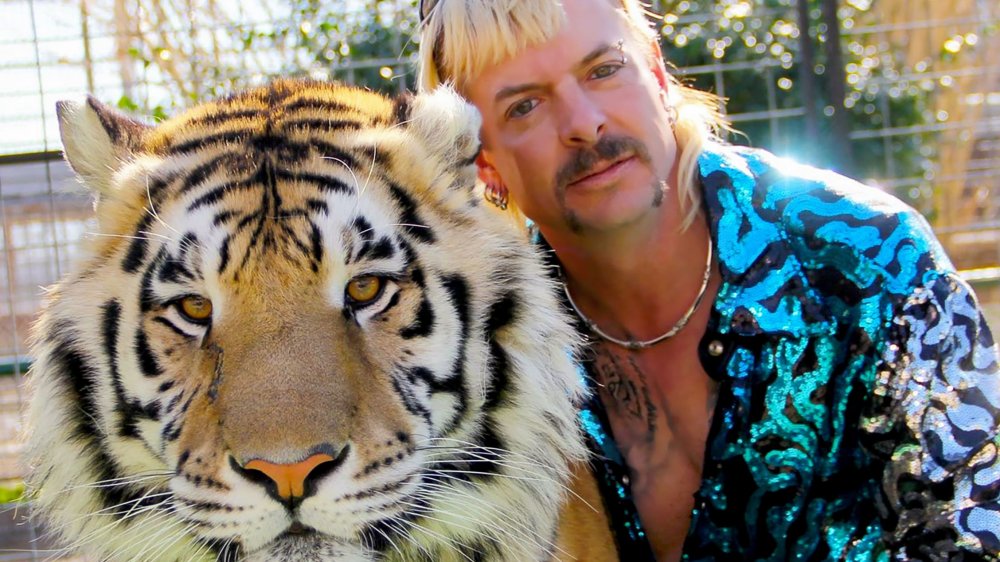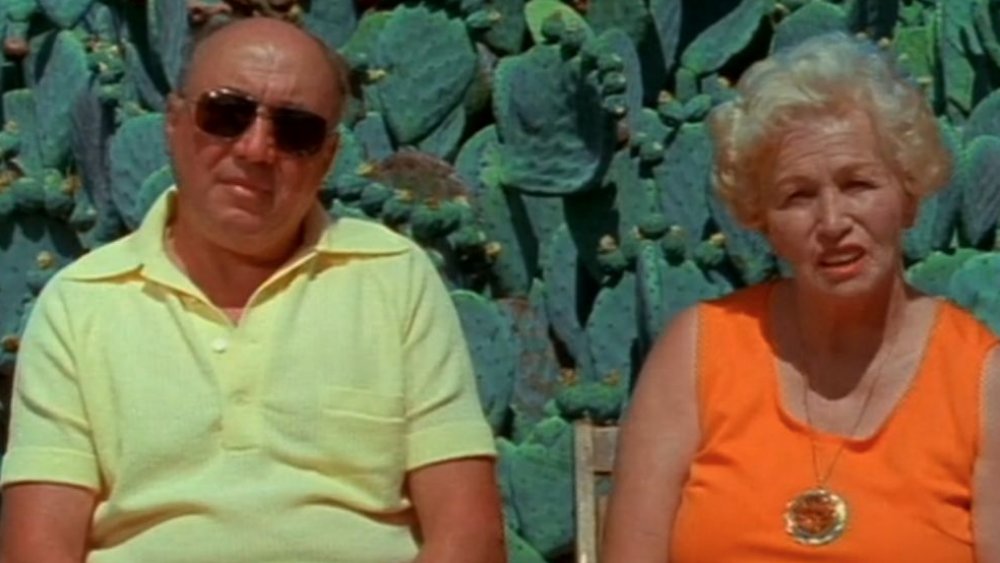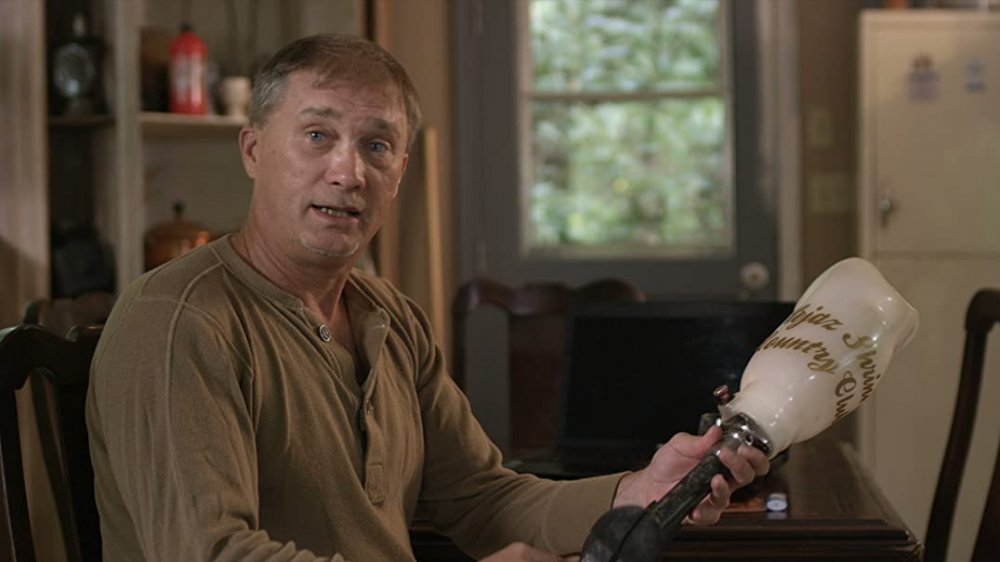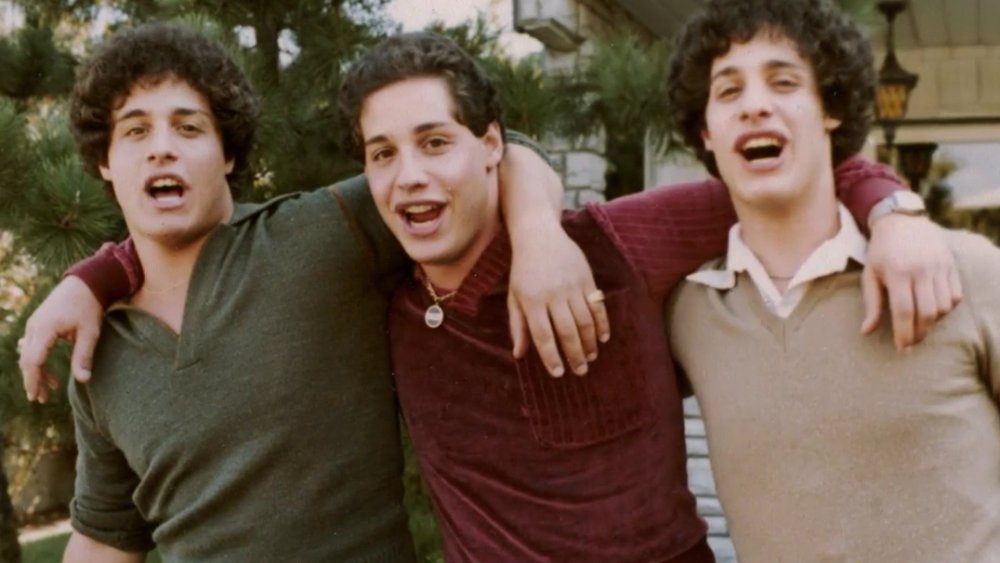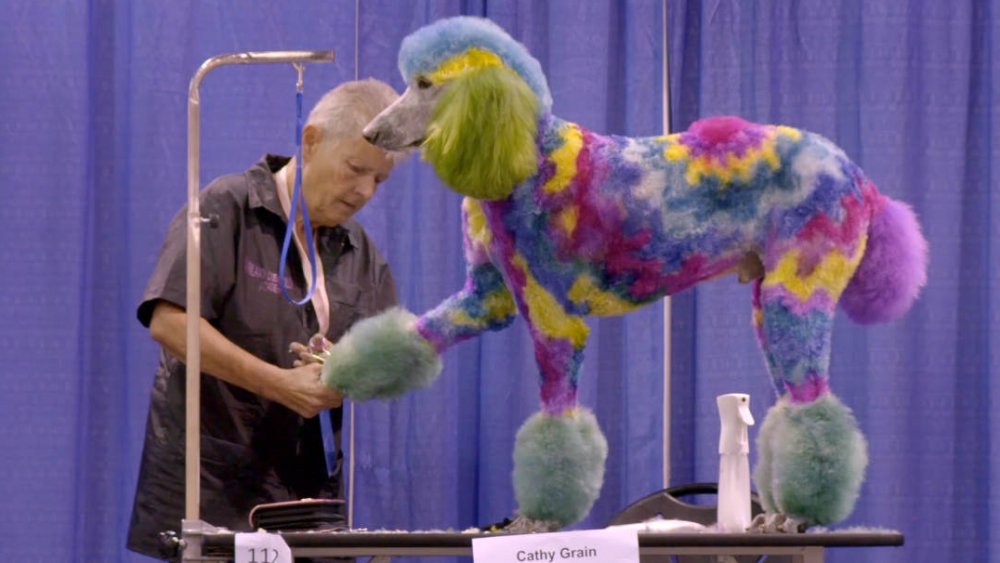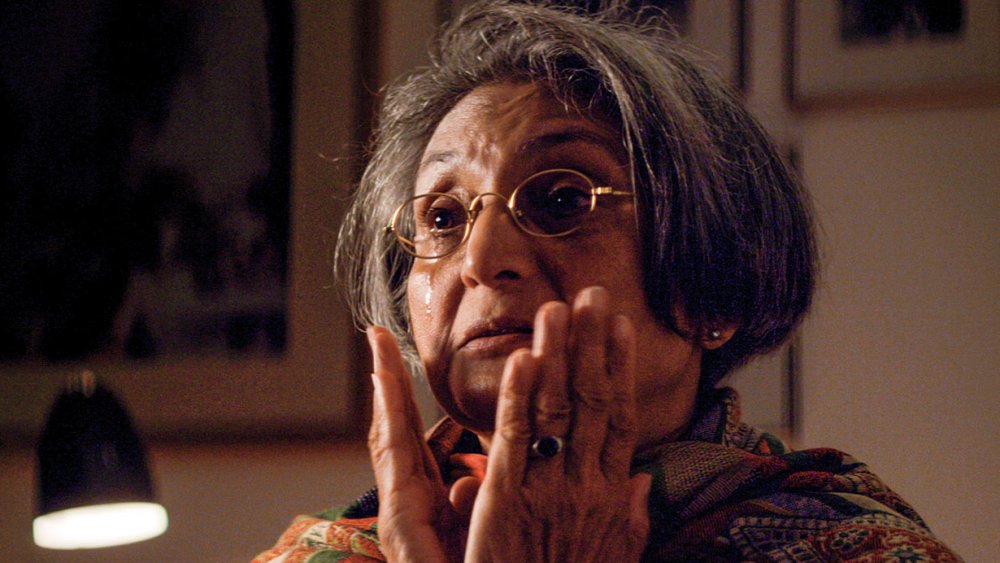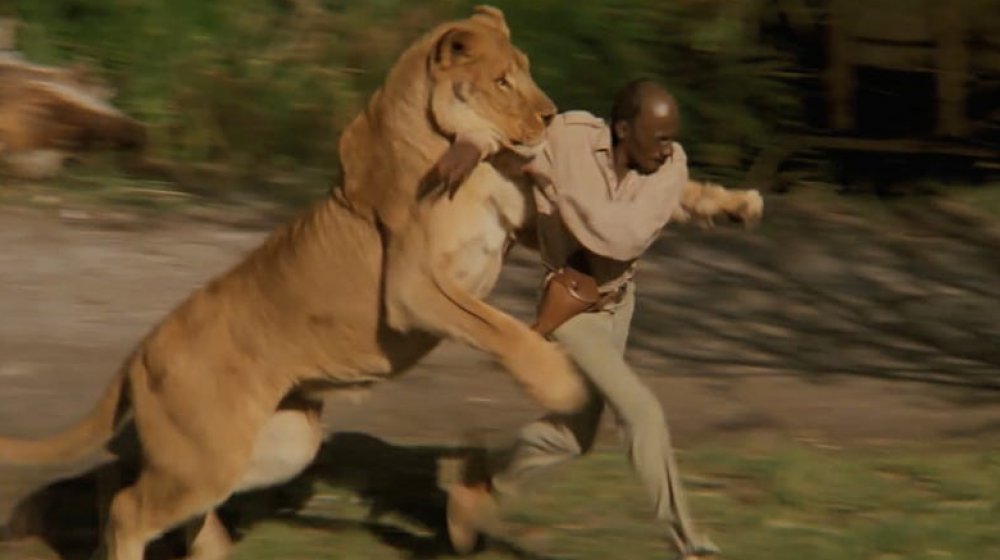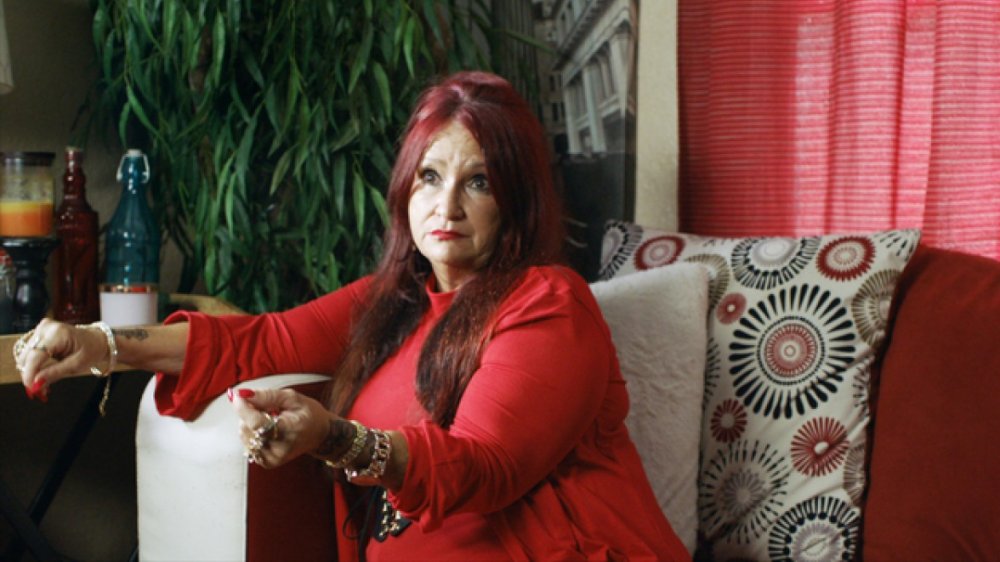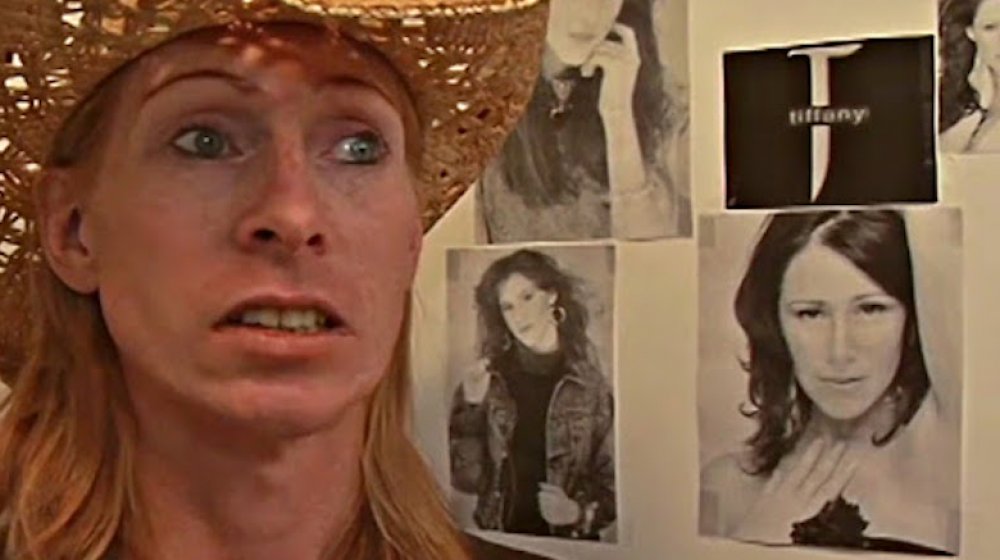Things You Should Watch If You Like Tiger King: Murder, Mayhem And Madness
Every year or so, another Netflix true crime miniseries becomes a national obsession that turns millions of viewers into amateur criminologists. The taut drama of mystery, conspiracy, and murder slowly and deliberately unravels over seven or eight episodes, making for some extremely bingeable television. And following in the tradition of Making a Murderer and The Staircase, there's Tiger King: Murder, Mayhem and Madness, the somehow true story of Joe Exotic — country musician, politician, polygamist, indefatigable self-promoter, and operator of a hands-on big cat zoo in Oklahoma.
Exotic was involved with many other tiger park players, and they all shared an enemy in animal rights activist Carole Baskin. But everything went haywire when Exotic, a court affirmed, tried to have Baskin killed. It's a story so intoxicating and weird that viewers are left wanting more once the final episode ends. So until the next big Netflix hit comes along, here are some other documentaries (and documentary-like productions) that should fill the Tiger King-sized hole in your heart.
Like Tiger King, Gates of Heaven is about people obsessed with animals
Tiger King is about animal people — individuals so passionate about rescuing animals, being around them, or exploiting them that all normalcy in their lives fade away, and their entire identity becomes entwined with this beastly pursuit. Gates of Heaven is another documentary that explores this psychological trajectory. It's the first full-length film by acclaimed, Academy Award-winning documentarian Errol Morris, and like Tiger King, it's oddly hilarious at times ... which is surprising because it's about pet cemeteries.
Morris mainly tells the story of Floyd McClure, who gets the idea to create a dignified, final resting place for all domesticated creatures great and small after the death of his beloved collie. But he has a hard time making it happen, unlike John Calvin Harberts and company, who set up a successful pet cemetery as a family business. Cut into the storytelling are short interviews with perhaps the most devoted animal lovers of all — those who paid a lot of money to give their pets lavish funerals. Is it easy to laugh at quirky folks who spent a significant chunk of their savings on dog coffins and cat graves? Yes, but they're also people who experienced big losses when their pets died, and that's heartbreaking.
Finders Keepers is a real-life comedy
Real life is consistently bizarre. It's a comedy of errors that most of us stumble through, resulting in all manner of physical and emotional pratfalls. Documentaries — films that capture reality — are more often than not super serious, which means the ones that let this real-life comedy happen feel so refreshing and truthful. For example, there's Netflix's surprisingly wacky Tiger King, and there's also Bryan Carberry and Clay Tweel's rollicking and absurd Finders Keepers.
This hidden gem of a documentary begins in 2004, when, after suffering injuries in a small plane crash, John Wood has his leg amputated below the knee. Wood then asks the hospital where the surgery was performed for his bones back (hey, those are his bones) so he can use them as part of a memorial to his father, the deceased pilot of the plane that crashed. However, the hospital gives Wood his whole leg back — meat still there — which he decides to try and mummify by leaving inside of a barbecue in a storage shed.
But then Wood has an addiction relapse, forgets to pay his shed rent, and the contents get auctioned off, including the leg-filled barbecue. New owner Shannon Whisnant discovers the leg and wants to use it as some kind of roadside attraction. And thus, there are now two grown men fighting over an amputated leg, not in your typical courtroom but on a courtroom TV show. If this were a narrative film, it would feel contrived, but here, it's delightfully absurd.
Three Identical Strangers is just as weird and disturbing as Tiger King
If it's anything, Tiger King is just plain weird — a story so hard to believe and with so many diverging points that it's almost impossible to look away from it. And once they've started, viewers need to know how such a strange, messy story will wind up. The 2018 documentary Three Identical Strangers falls into this same category. It just keeps changing with each new revelation, but it begins as the story of three identical triplets — Edward Galland, David Kellman, and Robert Shafran. Why do they have three different last names? Because they were all adopted into different families at the age of six months old.
And yeah, things just get weirder from there, especially when we learn that the triplets didn't know about each other until they were young adults. But that's just the tip of the bizarro iceberg, especially as we discover there's a bigger, nefarious story at play when it comes to how the three siblings were separated. It's a crazy and disturbing tale of brotherhood and identity, and unfortunately, there isn't a happy ending for everyone — or even a middle part of the story for that matter.
Well Groomed looks at a very unique subculture
Documentaries and reality series are a wonderful way to see life from somebody else's point of view, particularly if they're from a section of society shrouded in mystery ... or one that most people don't even know exists. As Tiger King explores the little-known world of roadside animal parks and wildlife sanctuaries, Well Groomed looks at another creature-based subculture: competitive dog groomers. But dog grooming isn't just cutting a poodle's hair in the traditional way. It's using the animal as an artistic canvas, and participants dye hair and/or cut it in strange ways to fit a theme.
For example, take the dog with the green fur on its back arranged to look like scales (a la a Jurassic Park dinosaur) or the one with so much color and attention applied to it that it looks like the Mad Hatter from Alice in Wonderland. The action all culminates in the subjects (some of them champions and giants in their field) leaving their homes and dog salons in all the corners of America for a national contest in Pennsylvania. This documentary from HBO Films is such a low-key funny and insightful look into both small-town life and a low-stakes, hyper-competitive hobby that, at times, it feels like a real-life version of Christopher Guest's mockumentaries Waiting for Guffman and Best in Show.
If you want Tiger King-style interviews, try Wild Wild Country
One of the most interesting and mind-blowing elements of Tiger King is the extreme frankness of its interview subjects. Even though it's a tale of attempted murder, conspiracies, and cult leader-like figures, there are few unreliable narrators because everyone's being so honest about what went down with Joe Exotic's trial and imprisonment, with no fear of reprisal or prosecution. This style of storytelling — thanks to the full participation of its subjects — is reminiscent of 2018's Netflix insane documentary series, Wild Wild Country.
Like the Oklahoma-based Tiger King, Wild Wild Country is about a chapter of history not well-known outside of its region of origin, a tiny town in eastern Oregon. In 1981, the acolytes of Indian guru (and "free love" religious movement leader) Bhagwan Shree Rajneesh bought up the land in and around Antelope, Oregon, to use as a home base. Three years later, the Rajneesh's increasingly aggressive supporters (led by the calculating business director Ma Anand Sheela) had taken over Antelope's government, renamed the place Rajneeshpuram, and went after anyone who got in their way. They stockpiled weapons, blew up buildings, poisoned salad bars in Oregon restaurants, all in the name of the movement. And this wild, wild story is told with home movie and contemporaneous news footage, as well as present-day interviews with Sheela and other still-living, not-imprisoned participants, many of whom don't seem very ashamed of their actions.
Tiger King ain't got nothing on Roar: The Most Dangerous Film Ever Made
Decades before Tiger King reminded Americans that tigers and other big cats are gigantic animals that should be both respected and feared, there was a 1981 movie called Roar that did the very same thing. Or at least it tried to. Tippi Hedren, the actress best known for her role in the horror classic The Birds, dedicated her life, Carole Baskin-style, to saving big cats. She opened the Shambala Preserve north of Los Angeles, and that's where the bulk of production for Roar took place, a narrative film made with her husband, Noel Marshall, which went so far over budget and blew past schedule deadlines so often that Hollywood was left alienated and never released the movie in the U.S.
However, the behind-the-scenes story of Roar was far more interesting than the movie itself, if not legendary, and the harrowing truths were finally all laid bare in documentary form in 2015's made-for-Animal Planet Roar: The Most Dangerous Film Ever Made. In the doc, we discover that Hedren was bitten on the head by a lion, and after being thrown by an elephant, endured bone fractures and skin graft surgeries. Marshall was bitten so many times that he got gangrene. Cinematographer Jan de Bont was even scalped by a lion. All in all, around 70 people were directly and painfully injured while working with the animals that Joe Exotic and friends purport to love. In short, the '81 movie is one of the most dangerous films ever made, and the documentary is a fascinating look at all the big cat insanity.
McMillions is a true crime tale that gets crazier and crazier
Right before Tiger King became the most discussed true crime series of 2020, that honor went to McMillions, a multi-part HBO documentary that gets increasingly more wild and unbelievable the longer its makers allow it to ever so slowly unfold. As Tiger King starts with a familiar thing that ends in tragedy — a roadside zoo that winds up with an owner in prison over a failed hit job — McMillions begins with the popular and enduring McDonald's Monopoly promotion ... and uncovers that the whole thing was rigged for years.
Discovering the truth involved multiple FBI branch offices (with de facto leadership coming from the clashing styles of by-the-book Mark Devereaux and brash, cocky Doug Mathews), as well as Mafia families, a security guard with a criminal past, brothers turning on brothers, and so many more impossible-to-predict twists that it's no wonder this story stayed hidden for so long and that the perpetrators got away with stealing, selling, and making millions off fast food game tickets for more than a decade.
I Think We're Alone Now is story all about obsession
While the stories of Joe Exotic, Carole Baskin, and Doc Antle all end differently, they all more or less start out the same. All three managed a big cat preserve or zoo because they all feel a profound connection to tigers and such. One might call them obsessive, and obsession is a fascinating trait to observe in others, particularly when common sense suggests the individual has gone past the point of no return in pursuit of their pet cause. That's why Sean Donnelly's 2008 documentary I Think We're Alone Now is so compelling. It unflinchingly explores extreme, if not toxic, fandom that borders on mental illness.
Remember 1980s pop star Tiffany, famous for "I Think We're Alone Now" and touring malls? By the 2000s, she was playing "nostalgia" concerts, starring in B-movies, and trying to keep her distance from guys like Jeff Deane Turner. He's the world's biggest Tiffany fan, proven by his extensive collection of Tiffany memorabilia, which includes a restraining order, the many letters he's written to her (returned unopened), and news clippings about that time he got arrested when he tried to gift the singer a sword. Interspersed with Turner's slightly wacky story is that of another Tiffany obsessive, Kelly McCormick, who used Tiffany's music to cope with changing gender identity and a horrendous childhood.
Perfect Bid is an easygoing 'heist' movie about the world's biggest superfan
The nugget of a good documentary is a good story, one that's calling out to be told and in a way that only the images and sounds of film can deliver. And documentaries don't have to be about horrific crimes or world-changing events. Some of the best ones are about ordinary people who did extraordinary things. Perfect Bid: The Contestant Who Knew Too Much is that kind of documentary. It's about a guy named Ted Slauson who became such a superfan of the TV game show The Price is Right that he cracked the game.
Decades ago, the long-running CBS show tended to offer the same products and prizes, rotating them out every so often. Slauson tracked the prices of the products (bid on in individual games) and the prizes (whose values are estimated in the show-ending "Showcase Showdown") and memorized nearly all of them. Right after he turned 18 and was eligible to be a contestant, Slauson hit Los Angeles and became a contestant on The Price is Right, but his story doesn't end there. He was such an expert that his experience factored into the success of a later game show contestant. It's not cheating, it's not criminal, but Perfect Bid feels like the most joyful, easygoing heist movie of all time.
American Vandal takes aim at Netflix documentaries like Tiger King
Netflix has deftly figured out the perfect formula for multi-part crime documentaries. Tropes like overhead shots, menacing music, and long "talking head" shots combine to build suspense and a well-polished quality. All of that and more are perfectly parodied in the Netflix original series American Vandal. It looks and feels like a true crime multi-parter, except that it's a mockumentary.
So what's the requisite crime of the century explored in exquisite detail in season one of the show? Well, it's who crudely spray-painted male genitalia on the teachers' cars in the parking lot of a California high school. The most likely — but possibly railroaded — culprit is class clown and unoriginal prankster Dylan Maxwell (Jimmy Tatro). AV club documentarians Peter Maldonado and Sam Ecklund (Tyler Alvarez and Griffin Gluck) set out to make a film to find the truth, however elusive, which also means plenty of dead serious explorations (and forensic re-creations) of bits of evidence.
And in a nod to how Netflix could be considered exploitative in turning crime into entertainment, American Vandal got a second season, in which Peter and Sam inexplicably travel to Seattle to help solve an even grosser and more hilarious mystery about who laced a high school lunchroom's lemonade supply with powerful laxatives.
